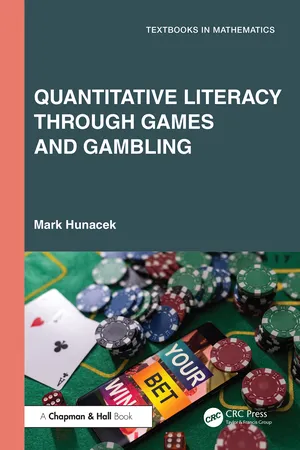
- 120 pages
- English
- ePUB (mobile friendly)
- Available on iOS & Android
Quantitative Literacy Through Games and Gambling
About this book
This book was developed to address a need. Quantitative Literacy courses have been established in the mathematics curriculum for decades now. The students in these courses typically dislike and fear mathematics, and the result is often a class populated by many students who are unmotivated and uninterested in the material.
This book is a text for such a course; however, it is focused on a single idea that most students seem to already have some intrinsic interest in and is written at an accessible level. It covers the basic ideas of discrete probability and shows how these ideas can be applied to familiar games (roulette, poker, blackjack, etc.). The gambling material is interweaved through the book and introduced as soon as the necessary mathematics has been developed. Throughout, mathematical formalism and symbolism have been avoided, and numerous examples are provided.
The book starts with a simple definition of probability, goes through some basic concepts like combining events and expected value, and then discusses some elementary mathematical aspects of various games. Roulette is introduced very early on, as is the game of craps, which requires some knowledge of conditional probability. Other games like poker, blackjack, and lotteries, whose study requires some rudimentary combinatorics, come shortly thereafter. The book ends with a brief introduction to zero-sum games, with some attention paid to the use of these ideas in studying bluffing.
In addition to discussion of these traditional games, the author motivates probability by talking about a few applications in legal proceedings that illustrate how mathematics has been misused in the courtroom. There is also a discussion of the Monty Hall problem, a nonintuitive result in probability that has an interesting and colorful history.
Hopefully, students studying from this text will find that mathematics is not as horrible as they have always thought and offers some interesting applications in the real world. This should perhaps be the goal of any quantitative literacy course.
Frequently asked questions
- Essential is ideal for learners and professionals who enjoy exploring a wide range of subjects. Access the Essential Library with 800,000+ trusted titles and best-sellers across business, personal growth, and the humanities. Includes unlimited reading time and Standard Read Aloud voice.
- Complete: Perfect for advanced learners and researchers needing full, unrestricted access. Unlock 1.4M+ books across hundreds of subjects, including academic and specialized titles. The Complete Plan also includes advanced features like Premium Read Aloud and Research Assistant.
Please note we cannot support devices running on iOS 13 and Android 7 or earlier. Learn more about using the app.
Information
Table of contents
- Cover Page
- Half-Title Page
- Series Page
- Title Page
- Copyright Page
- Dedication Page
- Contents
- About the Author
- Preface
- 1. Sample Spaces and Events
- 2. Roulette
- 3. Conditional Probability and Independence
- 4. Craps
- 5. Counting Large Sets: An Introduction to Combinatorics
- 6. Poker
- 7. Lotteries and Keno
- 8. Blackjack
- 9. Farkle
- 10. An Introduction to Game Theory
- Index